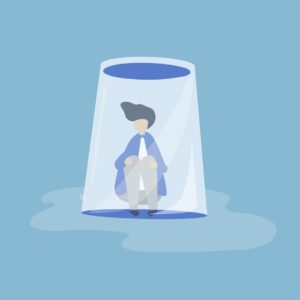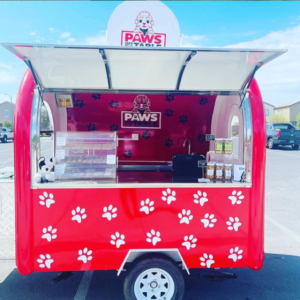3. You are being environmentally-friendly.
If you care about the environment, you should really be shopping locally and supporting local small businesses.
This is for a couple of reasons. The most major of which is shipping and transportation.
When you buy something from Amazon and have it shipped to you, you have to consider the environmental impacts of doing so. Many of the products we buy from places like Amazon, or other large companies such as Walmart, come from other places, whether they’re across the country or across the world. And whether those products are flown in on a plane or shipped over on a ship, they’re usually then transported by truck to stores or fulfillment centers, which overall contributes to a HUGE carbon footprint in terms of emissions.
The same goes for things like food products and animal livestock. Especially when you get food that is out of season and has to be grown and transported from other climates. When you buy locally grown food and locally raised meat, you’re cutting back on some of those emissions, depending on what you eat.
This leads us to the next reason why shopping locally is more environmentally friendly, at least in terms of food. Consider the fires in the Amazon or even the fires in Indonesia. They’re both a result of massive deforestation, but there is more to it than that. With the Amazon fires, the majority of the deforestation is for one of two things: to clear land to raise cattle OR to raise food to feed to the cattle. With Indonesia, the forests are being cut down for the production of palm oil for use in a vast array of products. When you buy locally, you’re generally not going to be contributing to massive deforestation – depending on where the business gets supplies from. And, small farmers, as opposed to factory farms, tend to take better care of their animals and there is less cruelty involved.
The next reason why shopping locally is better for the environment, particularly with food, is because local farmers are less likely to use chemicals on their crops, like pesticides and herbicides, or at the very least, are less likely to use massive amounts of it. When large agribusinesses rely on these chemicals, it creates runoff from chemicals and fertilizers, which destroy soil quality and also contaminate water. They are also a huge contributor to ocean dead zones, the name of which is self-explanatory.
Instead, small farmers are more likely and more willing to instead utilize companion planting and using natural pest-resistant measures as solutions for pest and weed control, as well as to provide nutrients to the soil.
If you don’t know what companion planting is, it is the practice of planting specific plants near or around other specific plants for various benefits. These benefits include providing pest resistance, keeping weeds away, and even naturally fertilizing the soil by putting specific nutrients into the soil. Companion planting can also provide additional produce for the farmer offer, as opposed to growing a monoculture, or single-species, crop.
Other natural methods include utilizing insects such as ladybugs and praying mantises to eat pests that attack crops, as opposed to just spraying a bunch of chemicals on everything.
Worms and composting are also used to help the soil be healthy and full of nutrients, without the need to use massive amounts of fertilizer, if any.
And, of course, we can’t forget the bees! When local farmers are using natural methods to grow crops instead of pesticides and chemicals, they’re protecting one of the most important species on our planet – bees. If you haven’t heard of Neonicotinoid pesticides, they are pesticides that are directly linked to massive bee die-offs and bee colony-collapse, [4]. When they are sprayed on the plants and flowers bees visit while pollinating, they wreak havoc on not only their bodies but their entire colony. Local farmers understand the massive importance of pollinators such as bees and other pollinating species and are more likely to protect them through their farming practices.
So, if you want to save the environment, the ocean, our air, our water, our climate, and a variety of organisms – shop locally, and shop when things are actually in season!
I hope by now if I haven’t lost you in the midst of all that I’ve written, that you are thoroughly inspired to start shopping and being a patron to local small businesses. It’s definitely a habit change that you have to really work at and can take some time as you progress towards the goal of putting less money into corporate consumerism.
I’m not saying to never shop at a major, brand name company again, or to never eat at a chain restaurant. Rather, I am encouraging you to look around your community and see what your alternatives are. There are always going to be things that are only available online or with specific retailers. Or maybe you’re super loyal to a specific brand. And that is okay.
The point is to try and to be a part of a movement of people to grow communities and make them better for the people who live there. You might even find that you live life a little more simply, with more purpose and a sense of fulfillment, as well as a feeling of direct involvement in the world and the people around you.
And, you can stick it to those giant corporations who are hoarding wealth while exploiting not only the labor of their employees but while also exploiting the resources and limits of our environment. So, this holiday season, don’t make shopping at small businesses just a one-day thing on Small Business Saturday – make it a lifestyle change!
***
Want to start shopping locally, but need some advice on where to start looking or how to transition away from your current shopping habits? Then stay tuned for my next article where I will briefly touch on how to do that! In the meantime, just keep an eye out for places you’ve never heard of or places that only have one or two locations. And, attend events in your community that focus on local business, like pop-up markets and farmers markets!
- https://www.history.com/news/whats-the-real-history-of-black-friday
- https://www.independentwestand.org/what-happens-when-you-shop-local/
Source for the comment made: *Source: Civic Economics – Andersonville Study of Retail Economics. - https://www.factorfinders.com/small-business-job-creation-vs-big
- https://www.pbs.org/newshour/science/neonicotinoid-pesticides-slowly-killing-bees



